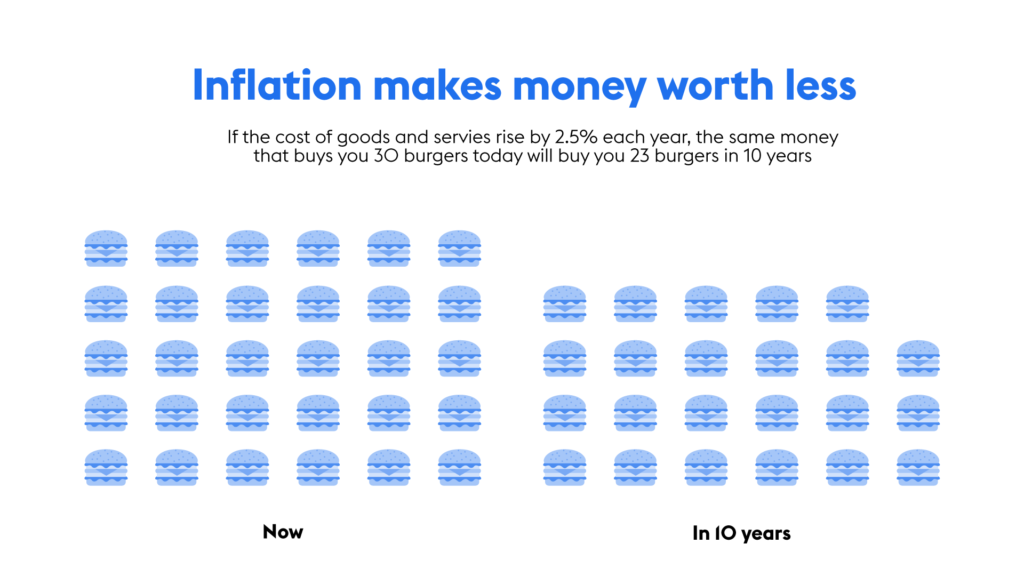Inflation is one of those economic terms that is seemingly repeated ad nauseam by politicians, economists, academics, and anyone in the banking and investment community. It’s a term we’ve certainly heard frequently during the COVID-19 related economic turmoil of the past 18 months. But what is inflation, and what is the impact of inflation on the average consumer?
What Exactly Is Inflation?
The simplest definition of inflation is a sustained upward movement of the overall value level of goods and services in the economy. Inflation refers to the increased prices of most products and services of daily or general use, such as food, clothing, housing, leisure, and transportation. Inflation occurs when prices rise, reducing the purchasing power of a nation’s currency.
Major indicators of inflation include the:
– Consumer Price Index (CPI)
– Price of gold
– Wholesale Price Index (WPI)
– Price of personal consumption expenditure (PCE)
These indicators use different measures to track the changes in the prices paid by consumers, producers, industries, and the economy as a whole. A low and steady inflation rate of 2% is desirable and indicative of a healthy economy, while a high change in inflation can be a significant cause for concern. Enter hyperinflation.
Hyperinflation is exactly what it sounds like: an extremely rapid, uncontrolled, and high rise in a country’s inflation rate, which is typically rare in developed economies. In inflation-adjusted terms, hyperinflation is anything that increases over 50% per month, and it is devastating to an economy. However, hyperinflation has occurred in many countries throughout history, including China, Germany, Russia, Hungary, and Argentina. In more recent times, Lebanon is currently experiencing shocking hyperinflation, with rates reaching over 150% in early 2021. Venezuela has also experienced hyperinflation in the not-so-distant past, with rates reaching 10 million percent.
The Cause and Effect of Inflation
If central banks print more money, inflation is likely to rise. According to classical economists and monetarists, inflation is caused by an increase in the money supply. This increase in money supply can lead to workers demanding higher salaries, which in turn pushes up wages and results in increased labor costs. These rising costs then create a higher price cycle which leads to an increase in the cost of living.
Another leading cause of inflation is a misalignment between supply and demand, namely high demand with insufficient supply to meet said demand. This results in a supply shortage which can also trigger pricing increases.

Protecting Your Money from Inflation
Inflation negatively impacts cash, and those who are hoarding cash will be hardest hit by the effects of inflation. This is because inflation grows at about 2% annually, therefore decreases the value of your money at the same rate. You would therefore need to adopt financial strategies that make positive returns of over 2%, to allow your money to both balance out the impact of inflation while actually increasing its purchasing power.
A key strategy for this is investing – which tends to see better than 2% returns in general. Those who have a diversified investment portfolio will be best insulated from the impacts of inflation. A diversified portfolio helps protect your wealth and can even grow your net worth.
Inflation can occur in any market or economy, but investors can plan for it by investing in a mix of asset classes that tend to outperform the market in inflationary climates. Some of these asset classes include:
Stocks
Publicly traded companies may weather the inflation storm better than the average consumer, and depending on the nature of the business, may even profit from inflation activity. When looking to invest in stocks, investors are cautioned to seek high-performing companies that can pass along rising costs to their customer base without losing it.
Real Estate
Along with the prices for other goods and services, inflation may drive up real estate prices, which is a win for anyone with real estate holdings in their portfolio. Not only will the value of the property (or properties) increase, but so could the rental income.
Commodities
Commodities are widely considered to be a solid hedge against inflation. A commodity is a term for a basic good. Examples of commodities include grain, natural gas, corn, and beef. Traditionally, commodity prices have picked up when inflation is rising, making them an attractive investment in an inflationary environment.
Gold also falls under this commodity category and is considered by many to be a good option for protection against market fluctuations.
Making Inflation Work for You
If you believe that future inflation is an important investment consideration, it makes sense to take steps to mitigate its impact. Needless to say, savvy investors would prefer to find ways to make inflationary cycles work best for them. SmartWealth is an online investment services platform designed to help you meet your financial goals through a customized investment plan.
Sign up with SmartWealth today and discover investment plans and strategies for making inflation work for, rather than against, you.



